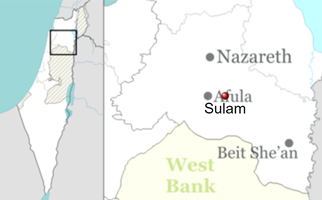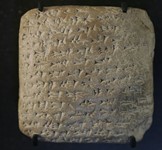Vayeirah
Vayeirah: II Kings 4:1-37[1]
Under the reigns of the wicked and idolatrous King Ahab, his Phonecian wife, Jezebel, and their successors, two prominent prophets arose: Elijah and his primary disciple, Elisha. Traveling across the powerful and prosperous Northern Kingdom, they performed acts of justice in the face of societal injustice and miracles in the face of mass idol worship, taught ordinary people to serve God, and inspired schools of prophetic disciples. Like Abraham, they stood alone against their surrounding society.
The Haftarah presents three of Elisha’s many miracles. The first is for an exceedingly poor widow of a prophetic disciple; her sole possession is a jug of oil. Like Sodom’s neglect of its poor and contrary to Abraham’s righteous path in the Parashah[2] and Torah law, her neighbors accept her creditors’ seizure of her sons to pay off her debts. Elisha miraculously multiplies her bit of oil so she can pay her debts, save her sons, and sustain her family.
Elisha’s other miracles in the Haftarah are for another God-fearing woman, this one at society’s apex. Welcoming travelers as Abraham and Lot do in the Parashah, she hosts Elisha on his periodic visits to her city, Shunem, eventually building him a private loft. With words nearly identical to those used in the Parashah by Abraham’s visitors when promising Sarah a son, Elisha promises the barren Shunammite with an elderly husband that she will miraculously bear a son. Years later, her son dies - a fate worse than Isaac’s near-death at his binding in the Parashah. The Haftarah closes with a third miracle as Elisha revives the dead boy.[3]
Haftarah Breakdown
Verses 4:1-7: Behind closed doors, Elisha saves a disciple’s widow and her sons with a miraculous amount of oil to alleviate her debts.
II Kings 4:7
She came and told the man of God. He said, “Go, sell the oil, pay your debt; you and your children will live off the remainder."
וַתָּבֹ֗א וַתַּגֵּד֙ לְאִ֣ישׁ הָאֱלֹקִים וַיֹּ֗אמֶר לְכִי֙ מִכְרִ֣י אֶת־הַשֶּׁ֔מֶן וְשַׁלְּמִ֖י אֶת־נשיכי [נִשְׁיֵ֑ךְ] וְאַ֣תְּ בניכי [וּבָנַ֔יִךְ] תִֽחְיִ֖י בַּנּוֹתָֽר׃
Verses 4:8-10:A prominent Shunammite woman feeds Elisha during his recurring visits, later building a private loft on her roof for this “holy man of God”.
II Kings 4:10
Let us now make a little upper chamber with walls. We will place for him there a bed, a table, a chair, and a lamp so that when he comes to us, he shall turn in there.
נַֽעֲשֶׂה־נָּ֤א עֲלִיַּת־קִיר֙ קְטַנָּ֔ה וְנָשִׂ֨ים ל֥וֹ שָׁ֛ם מִטָּ֥ה וְשֻׁלְחָ֖ן וְכִסֵּ֣א וּמְנוֹרָ֑ה וְהָיָ֛ה בְּבֹא֥וֹ אֵלֵ֖ינוּ יָס֥וּר שָֽׁמָּה׃
Verses 4:11-17: Elisha summons her, offering to repay her kindness with access to powerful officials, but she declines. At the recommendation of his servant, Gehazi, Elisha promises that despite her infertility, she and her elderly husband will soon have a son. She asks him not to deceive her. The boy is born.
II Kings 4:16
[Elisha] said, “About this time in the coming year, you shall embrace a son." She said, "My lord, O man of God, do not deceive your maidservant."
וַיֹּ֗אמֶר לַמּוֹעֵ֤ד הַזֶּה֙ כָּעֵ֣ת חַיָּ֔ה אתי [אַ֖תְּ] חֹבֶ֣קֶת בֵּ֑ן וַתֹּ֗אמֶר אַל־אֲדֹנִי֙ אִ֣ישׁ הָאֱלֹקִים אַל־תְּכַזֵּ֖ב בְּשִׁפְחָתֶֽךָ׃
Verses 4:18-21: Years later, the boy faints while working in the field. His father has workers bring him home to his wife, upon whose knees he dies. She places him on Elisha’s bed.
II Kings 4:20
[His father’s servant] carried [the boy], bringing him to his mother. He sat on her knees till noon, and died.
וַיִּשָּׂאֵ֔הוּ וַיְבִיאֵ֖הוּ אֶל־אִמּ֑וֹ וַיֵּ֧שֶׁב עַל־בִּרְכֶּ֛יהָ עַד־הַֽצָּהֳרַ֖יִם וַיָּמֹֽת׃
Verses 4:22-31: Summoning a donkey from her surprised husband, she races to Elisha to reproach him for breaking his promise. Elisha stops Gehazi from stopping her, dispatching him to revive the child; he fails. Elisha accedes to her insistence that he revive the boy, travels to him, and enters his chamber, closing its door to pray.
II Kings 4:31
Gehazi had traveled before them. He laid [Elisha’s] staff on the child’s face, but there was neither voice nor sound. [Gehazi] turned back to meet [Elisha], telling him, “The child is not awakened.”
וְגֵחֲזִ֞י עָבַ֣ר לִפְנֵיהֶ֗ם וַיָּ֤שֶׂם אֶת־הַמִּשְׁעֶ֙נֶת֙ עַל־פְּנֵ֣י הַנַּ֔עַר וְאֵ֥ין ק֖וֹל וְאֵ֣ין קָ֑שֶׁב וַיָּ֤שָׁב לִקְרָאתוֹ֙ וַיַּגֶּד־ל֣וֹ לֵאמֹ֔ר לֹ֥א הֵקִ֖יץ הַנָּֽעַר׃
Verses 4:32-37: Elisha miraculously revives the child.
II Kings 4:35
[Elisha] repeatedly walked about the house to and fro. He arose and stretched himself upon [the child]. The child sneezed seven times, and the child opened his eyes.
וַיָּ֜שָׁב וַיֵּ֣לֶךְ בַּבַּ֗יִת אַחַ֥ת הֵ֙נָּה֙ וְאַחַ֣ת הֵ֔נָּה וַיַּ֖עַל וַיִּגְהַ֣ר עָלָ֑יו וַיְזוֹרֵ֤ר הַנַּ֙עַר֙ עַד־שֶׁ֣בַע פְּעָמִ֔ים וַיִּפְקַ֥ח הַנַּ֖עַר אֶת־עֵינָֽיו׃
Haftarah Geography & Archaeology
Shunem is generally identified with the modern city of Sulam, 3 miles east of Afula, around 30 miles from Mt. Carmel, and southwest of the Sea of Galilee (the Kinneret). The Egyptian Armana letters also mention it.
Connections
The Shunammite woman’s behavior is the source of the obligation to visit one’s teacher on holidays.
Rosh Hashanah 16b
Rabbi Yitzḥak said: “One is obligated to greet his teacher on a Festival, as [II Kings 4:23] states, ’Why will you go to him today; it is neither the New Moon nor a day of rest?’ ” - implying that on the New Moon and on a day of rest, she is required to go.
א"ר יצחק חייב אדם להקביל פני רבו ברגל שנאמר (מלכים ב ד, כג) מדוע את הולכת אליו היום לא חדש ולא שבת מכלל דבחדש ושבת איבעי לה למיזל
[1] Sephardim read up to verse 23.
[2] See Ezekiel 16:49 and Gen. 18:19.
[3] With emendations, all translations are from Sefaria.org. To dedicate, comment, or subscribe, email haftarahhelper@gmail.com.
(Images from Wikimedia under Creative Commons License. All images are property of their creators.)


